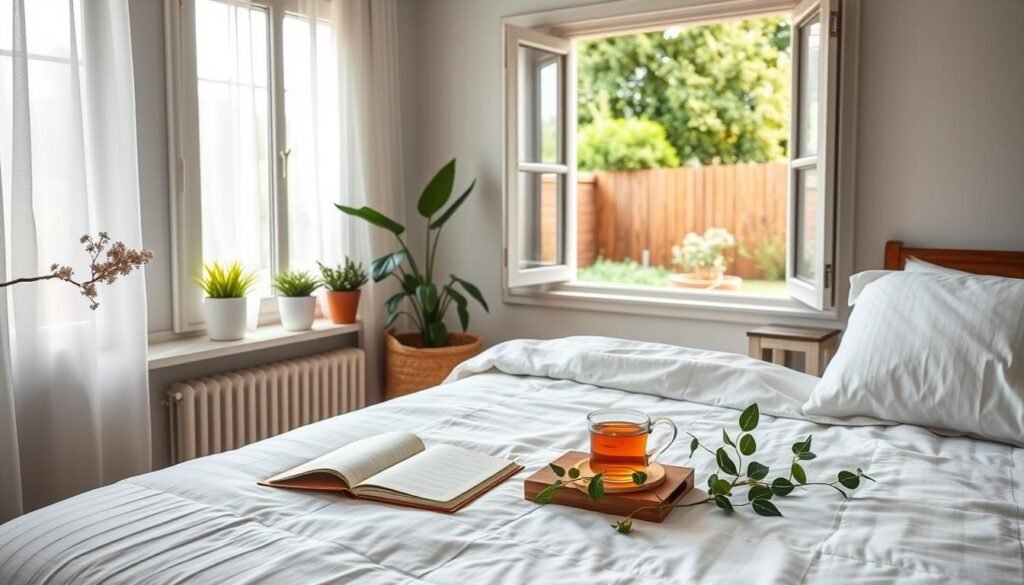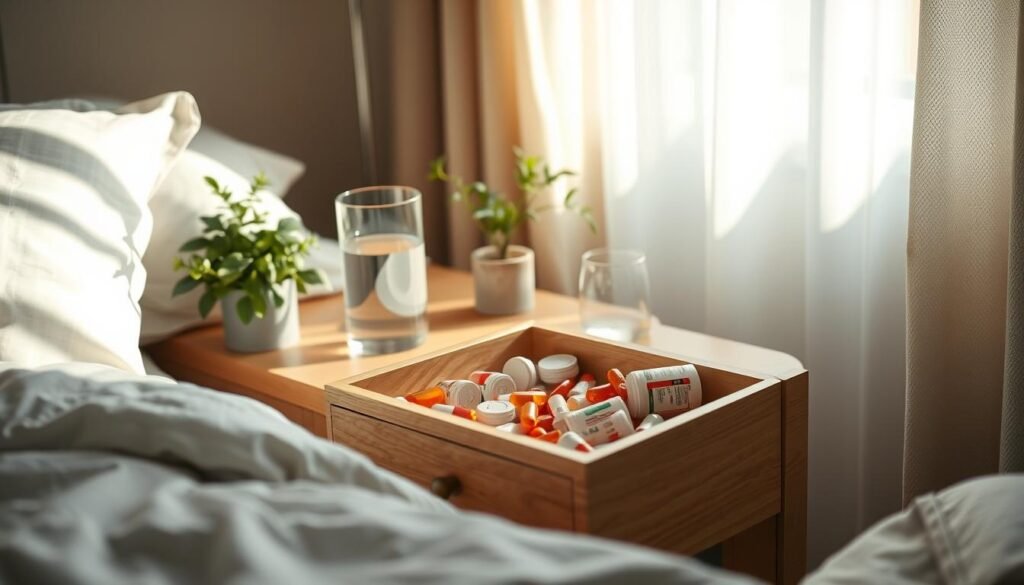About 1 in 75 people suffer from nocturnal panic attacks. These often happen unexpectedly during sleep. They leave people feeling lost and anxious when they wake up. Morning anxiety brings sudden fear and physical signs like face tingling. This can really affect someone’s day and their mental health.
If you’re feeling extremely stressed or have an anxiety disorder, it’s important to notice these signs early. Experts say having over two panic attacks a month is a sign to see a doctor. Thankfully, there are many resources and techniques to help those in distress. Let’s explore more about anxiety attacks and how to get help.
Key Takeaways
- Nocturnal panic attacks occur in approximately 1 in 75 people.
- Face tingling anxiety is a common symptom associated with panic attacks.
- Recognizing symptoms early can lead to effective management of morning anxiety.
- Professional mental health support is crucial for sustained recovery.
- More than two panic attacks per month may necessitate medical intervention.
Understanding Anxiety Attacks
Anxiety attacks bring intense fear. They are overwhelming. It’s easy to confuse them with panic attacks. Both have common symptoms, yet they show up differently.
People might feel their heart race or start to sweat. They might fear something bad will happen. These feelings can come out of nowhere, even at night. This can mess up someone’s sleep and make them feel worse.
It’s important to know about different anxiety disorders. Disorders like generalized anxiety and social anxiety each have their own symptoms. Knowing what to look for helps people seek help sooner. Without help, anxiety can make daily activities hard.
Many find relief in therapy, especially cognitive behavior therapy (CBT). CBT helps change the negative thoughts that feed anxiety. Sometimes, medication is needed. Antidepressants can reduce symptoms and improve life.
Seeking professional advice is key for those with anxiety. Getting help early can make a big difference. This can be through therapy or medication.
| Type of Treatment | Description |
|---|---|
| Cognitive Behavior Therapy (CBT) | A form of therapy that focuses on modifying negative thought patterns. |
| Antidepressants | Medications that help to alleviate anxiety symptoms and improve mood. |
| Mindfulness Techniques | Practices that promote awareness and focus on the present moment, reducing anxiety. |
| Support Groups | Community resources for sharing experiences and coping strategies. |
Being proactive about anxiety is empowering. Recognizing symptoms of anxiety attacks is the first step. After that, finding the right help is crucial.
What Causes Waking Up with Anxiety?
Many people find waking up with anxiety to be a tough experience. Several causes of anxiety add to these feelings. These include stressful life changes and underlying health issues. Things like changes at work, money worries, or relationship troubles are common triggers. For people with generalized anxiety disorder (GAD), their constant worry can make mornings feel especially hard.
It’s important to understand how stress and anxiety are connected. When your body reacts to stress, it releases cortisol. This can make anxiety worse in the morning. Psychological factors also play a role as the mind goes over unsolved problems. Knowing these causes helps people take steps towards managing their anxiety more effectively.
| Cause | Description | Potential Solutions |
|---|---|---|
| Job Changes | Starting a new job can make you feel unsure and anxious. | Talk with colleagues for support, make a plan for the new role. |
| Relationship Issues | Problems with your partner can lead to anxiety. | Try counseling or talking openly to work through issues. |
| Financial Stress | Worrying about money can cause a lot of stress and anxiety. | Make a budget, get financial advice, or work on paying off debts. |
| Past Traumas | Old traumas coming up can result in morning anxiety. | Seek out therapy that focuses on healing from trauma. |
Understanding these factors is key in tackling morning anxiety. Taking action can help lead to calmer mornings.
The Role of Stress in Morning Anxiety
Stress is key in feeling anxious in the morning. When we see danger, our bodies release cortisol. This hormone peaks when we wake up, making us feel more anxious. The cortisol awakening response can make our hearts race and adrenaline shoot up, making us feel panicked as soon as we wake up.
Life’s ongoing stresses add to morning anxiety. Health worries and issues with others make it worse. High cortisol in the morning can ruin sleep and daily activities. Not sleeping well makes us even more anxious when we wake up. Learning to manage stress helps lessen morning anxiety.
Our lifestyle choices are also linked to anxiety. Things like caffeine and smoking bump up anxiety levels. But eating lots of fruits and veggies can lower it, say University of Michigan School of Public Health experts.
Exercise is great for fighting stress and anxiety. It lowers adrenaline and boosts dopamine, which helps control anxious feelings. But, drinking alcohol can make anxiety and panic attacks more likely.
If anxiety messes with your life, get help. Dealing with stress properly can make you feel better mentally.
| Life Stressors | Effects on Morning Anxiety |
|---|---|
| Health concerns | Can lead to constant worry and increased cortisol levels |
| Interpersonal conflicts | Heightened emotional responses and panic feelings |
| Financial problems | Increased pressure resulting in anxiety symptoms |
| Big life events | Potential triggers for morning anxiety episodes |
| Bereavement | Intensifies feelings of loss and stress, affecting morning mood |
Dealing with what stresses us out can make mornings calmer and improve life overall.
Recognizing Symptoms of Anxiety Attacks
It’s key to know the symptoms of anxiety attacks for those struggling. These symptoms can be both physical and mental. They lead to severe anxiety affecting everyday life.
Some common anxiety symptoms are:
- Racing thoughts hard to manage
- Irritability or sudden mood changes
- Trouble focusing on tasks
- Feeling a tight chest
- Struggling to breathe well
Many people start feeling these symptoms as they wake up. It makes mornings tougher. Recognizing and dealing with these signs early is crucial.
Physical symptoms during an attack include:
| Physical Symptoms | Description |
|---|---|
| Heart Palpitations | A racing or pounding heart, often during panic attacks. |
| Trembling | Shaking mostly in arms, legs, hands, and feet. |
| Excessive Sweating | Occurs with increased anxiety levels. |
| Chest Pain | It feels serious and makes many seek help. |
| Dizziness | Lightheadedness that can make focus hard. |
| Numbness | Often in hands, feet, and face, it feels unsettling. |
If anxiety persists, getting help is wise. Look at resources like the WebMD Anxiety Attack Symptoms guide. It has tips on treatments, like therapy or medicine, to lessen anxiety’s impact.

Face Tingling Anxiety: A Common Symptom
Face tingling anxiety usually appears when we’re very stressed. People often feel a tingling, numbness, or burning sensation on their face. This shows how our feelings can cause physical reactions. It’s a way to see the link between our emotions and how our body feels.
Understanding Paresthesia and Its Links to Anxiety
Paresthesia is common in those with anxiety disorders. Anxiety or panic attacks can lead to face tingling. This happens due to muscle tension affecting nerves. Many say their face, tongue, or head tingles during stressful moments. It shows how strongly anxiety is connected to these physical feelings.
How Stress Symptoms Manifest Physically
Stress can show up in our bodies in many ways, including face tingling. These symptoms might come from anxiety or more severe issues. Some causes are:
- Dental problems, like cavities, that stimulate face nerves.
- Bell’s palsy, which causes facial tingling and weakness.
- Trigeminal neuralgia, leading to sharp facial pain and tingles.
- Lack of B vitamins, causing nerve damage and tingling.
Many conditions can cause face tingling. Knowing these symptoms and where they come from is important. It helps with managing them properly.
Coping Strategies for Morning Anxiety
Waking up with anxiety can be tough. But, there are effective ways to deal with it. Daily exercises and mindfulness can help manage feelings of anxiety. They also build strength to handle stress better over time.
Physical Activities to Reduce Anxiety
Being active is great for fighting anxiety. Simple activities like walking, dancing, or yoga can make you happier and less anxious. Exercising regularly increases endorphins. These are chemicals that make you feel good and relaxed.
- Walking 30 minutes each day can lift one’s spirits.
- Yoga promotes flexibility and alleviates stress through controlled breathing.
- Dancing allows for self-expression while providing an aerobic workout.
Mindfulness and Relaxation Techniques
Mindfulness techniques help you control your thoughts and feelings. Meditating, deep breathing, and muscle relaxation can make you feel calmer and more focused. A relaxing bedtime routine can also help with anxiety. It can make it easier to fall asleep again.
- Meditation enhances self-awareness and promotes inner peace.
- Deep breathing exercises can reduce hyperventilation, a common symptom of anxiety.
- Progressive muscle relaxation helps in alleviating physical tension.

Using these coping methods as part of your mental health routine is key. With regular practice, you can fight anxiety more effectively. This leads to a healthier outlook on life over time.
Therapeutic Approaches to Anxiety Disorders
Various therapeutic approaches help manage anxiety disorders, offering hope to many. Cognitive behavioral therapy (CBT) is a top method. It targets and changes negative thoughts connected to anxiety. This empowers people to overcome challenging cycles of fear.
Exposure therapy is another technique. It asks people to face their fears in safe settings. This method reduces avoidance behaviors linked to anxiety. Acceptance and commitment therapy (ACT) combines mindfulness and goals. It improves flexibility in handling anxiety feelings.
It’s crucial for patients to work with mental health experts. Customized treatment plans focus on individual concerns. This ensures the most effective support. Through these methods, people can beat anxiety. They learn to build resilience and enhance their emotional health.
Medication Options for Managing Anxiety
People with anxiety often look for different ways to feel better. Medicines can play a big role in this, along with self-help methods. It’s key to know which medicine works best.
Types of Medications Prescribed for Anxiety
Doctors usually prescribe a few kinds of meds for anxiety. Selective Serotonin Reuptake Inhibitors (SSRIs) are common. They work for depression and anxiety. Serotonin-Norepinephrine Reuptake Inhibitors (SNRIs) are similar. They help with both problems too.
For really strong anxiety or panic, benzodiazepines might be used. They work fast but can cause side effects like being confused or forgetting things. If SSRIs or SNRIs don’t work, tricyclic antidepressants or Buspirone for Generalized Anxiety Disorder (GAD) may help.

Each medicine has its own side effects. For example, SSRIs might cause stomach issues or trouble sleeping. Benzodiazepines could make someone feel depressed or have stomach problems. It’s important to talk about these side effects with a doctor.
Self-Help Techniques to Consider
Self-help methods are great along with medicine. Things like exercising, eating right, and getting enough sleep help a lot. Mindfulness and relaxation can reduce stress too. Using both medicine and self-help can lead to better results.
For more about the difference between fear and anxiety, check out this topic. For more on meds for anxiety, visit here: anxiety medication.
The Importance of Professional Help
For those struggling with severe anxiety, getting professional help is key. Therapists and psychiatrists can offer great support. They do this by diagnosing and creating specific treatment plans. In therapy, patients find a safe place to share their thoughts and feelings.
Anxiety can cause many symptoms like numbness in the face and other parts. This happens due to reduced blood flow. Knowing these symptoms are common can help, but it’s crucial to see a doctor if they continue.
Support for anxiety includes things like medication, therapy, and caring for oneself. Those experiencing panic attacks often should seek a professional’s advice. Taking steps to manage mental health can really improve one’s life.
| Professional Help Options | Description |
|---|---|
| Therapy | Engaging with mental health professionals for personalized treatment. |
| Medication | Using prescribed medications to manage anxiety symptoms effectively. |
| Support Groups | Joining groups where individuals share experiences and coping mechanisms. |
| Self-Care Techniques | Utilizing relaxation methods, exercise, and mindfulness to alleviate symptoms. |
Improving Sleep Quality to Alleviate Anxiety
Improving sleep quality is crucial for those dealing with anxiety. Bad sleep can make anxiety worse. This creates a cycle of sleeplessness and worry. By improving sleep habits, one can greatly better their sleep quality.
Sleep Hygiene Tips for Better Rest
To get better sleep and reduce anxiety, try these tips:
- Maintain a consistent sleep schedule: Sleeping and waking up at the same times every day helps your body’s clock.
- Create a calming bedtime routine: Doing relaxing activities, like deep breathing or reading, helps calm your mind for sleep.
- Minimize screen time before bed: Less screen time helps your body get ready for sleep.
- Foster a sleep-friendly environment: A cool, dark, and quiet bedroom helps promote better sleep.
- Avoid caffeine and heavy meals: These can disrupt your sleep, making it hard to fall or stay asleep.
It’s important to recognize sleep disorders when managing anxiety. Cognitive Behavioral Therapy for Insomnia (CBT-I) is recommended for insomnia strugglers. It focuses on the link between anxiety and poor sleep. Research shows that about 40% of people with anxiety suffer from this, highlighting the need for good sleep practices.
Good sleep habits lay the groundwork to handle daily stress better. Striving for 7 to 8 hours of sleep each night is key. This helps with emotional control and resilience against anxiety.
Conclusion
Understanding morning anxiety requires knowing how stress, sleep, and feelings connect. Around 3% of American adults suffer from panic disorder annually. It’s key for those with symptoms like face tingling anxiety to seek help early. Mental health care is crucial for dealing with anxiety.
Using coping methods can greatly ease symptoms. Getting active, practicing mindfulness, and relaxation can really boost mental health. It’s important to understand how physical signs, like numbness, are linked to anxiety. Such symptoms are sometimes confused with other serious health issues. So, seeing a doctor for a correct diagnosis and help is wise.
To wrap up, dealing with anxiety with a comprehensive plan leads to recovery. Combining self-care with expert support creates a healing space. This aids in building strength and getting back control over mental well-being. This approach makes living with anxiety easier and leads to a happier life.